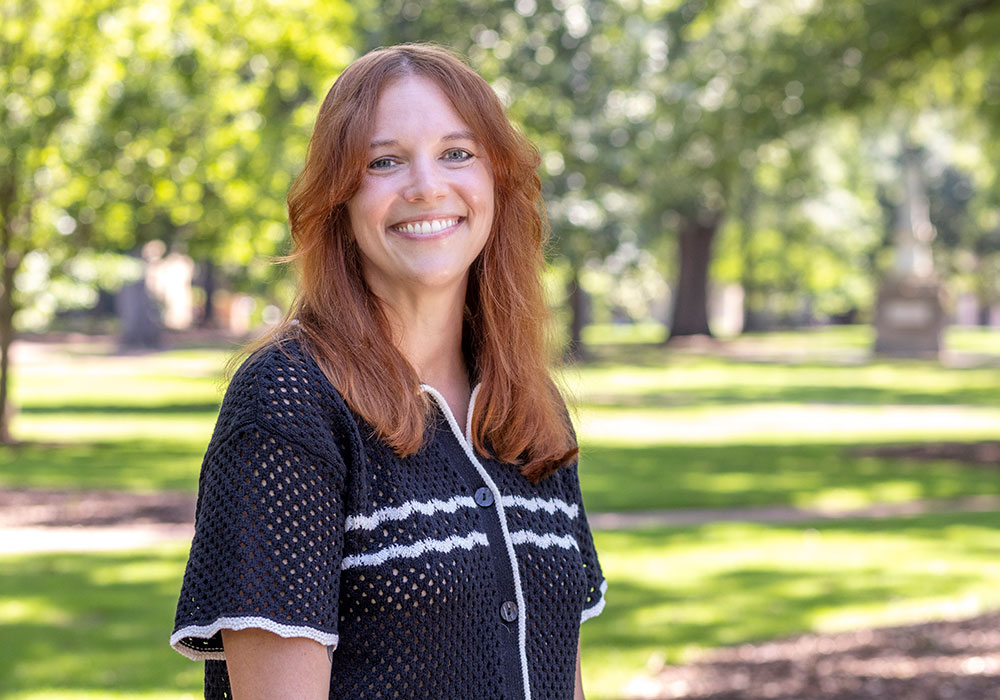Vanessa Kitzie is not afraid of technology. She also believes a good dose of skepticism is healthy.
One topic that’s garnering a good deal of skepticism is artificial intelligence. Kitzie, an associate professor, leads in the information science program in the University of South Carolina’s College of Information and Communications. Her classes examine topics like deepfakes, research methods, and social issues in information and communication technologies. Discussions about AI’s ethical concerns are inevitable — as Kitzie believes they should be.
“I start with that idea that we’re all, as people, very curious to understand the world and our place in it,” she says. “Then it’s about applying that curiosity in a way that’s healthy. Cultivating among students this form of healthy skepticism is what I’m going for.”
Asking why is an integral part of Kitzie’s personality. And asking why is critical in the Age of AI. As a 2025 winner of the university’s Garnet Apple Award for Teaching Innovation, Kitzie is putting the question to her students in ways that force them to consider the emerging technology from every perspective.
“If you avoid mentioning AI at all, or if you use a blanket generative AI statement, a lot of times students are still very confused as to what constitutes an acceptable versus unacceptable use,” she says. “I think we have to be extremely transparent about how we want them to use it, if at all, and then in what sorts of ways, because, ultimately, they are going into jobs in which AI use is expected.”
When CIC Dean Tom Reichert encouraged faculty to take an online certification course called Teaching with AI, Kitzie signed up. What she learned inspired her to develop a classroom AI policy based on traffic lights to help students better navigate assignments. Red-light assignments prohibit AI use. Yellow lights indicate AI is optional, and green lights mean it’s required. And when students use it — in a yellow-lighted discussion post, for example — they must include a statement explaining how.
The policy has helped students navigate how to use the technology ethically. It’s also opened their eyes to AI’s strengths and weaknesses.
"If you avoid mentioning AI at all, or if you use a blanket generative AI statement, a lot of times students are still very confused as to what constitutes an acceptable versus unacceptable use. I think we have to be extremely transparent about how we want them to use it, if at all, and then in what sorts of ways, because, ultimately, they are going into jobs in which AI use is expected."
“Something we’ve noticed is that it’s too broad in terms of coming up with ideas for papers and things like that,” Kitzie says. “And then at the same time, I’ve been extremely transparent with them as to how I’m using AI in the class.”
That might include running her feedback on students’ written assignments, along with the assignment’s rubric, through AI to generate examples of how to avoid unclear antecedents. She edits the results for accuracy, then shows students each step of the process so they know how she did it.
As she has discovered ways to incorporate these emerging technologies into the classroom, she has also discovered new strategies for managing different learning styles. For example, she frequently recommends an app to her auditory learners that will translate reading assignments into podcasts.
“I’m all for using AI when it facilitates your work,” she says. “So when I learn a neat trick, I try to highlight it to them, like, ‘Just in case this would be useful to you.’”
The challenge of helping students achieve breakthroughs while keeping pace with their evolving learning styles is what makes teaching fun for Kitzie. Her efforts have not only guided students through the information science classes she teaches, but they’ve also been critical to the major’s growth.
That’s because Kitzie has worked with a committee to develop various tracks within the major so that students can focus on specific interests such as cybersecurity and user experience design. The new tracks have made it easier to communicate the kinds of skill sets graduates can take into their careers.
“You don’t grow up as a kid knowing what information science is as a profession like you would something like nursing,” she says. “And there’s not a specific career title that’s connected with the field. So, a lot of it has been coming up with an engaging way to talk about the major.”
At the same time, she has also worked to modernize the curriculum so that it reflects emerging issues, trends and technologies. The results speak for themselves: Since becoming the information science program coordinator four years ago, enrollment has increased 169 percent.
Once the students are enrolled, their experiences in Kitzie’s introductory classes are often where their wheels begin turning.
“Probably the most rewarding thing is when I see a student who hasn’t attended much, and by the end of the semester, they’re coming, they’re participating,” she says. “They didn’t think they would be into the class, but they are. That’s rewarding for sure.”
